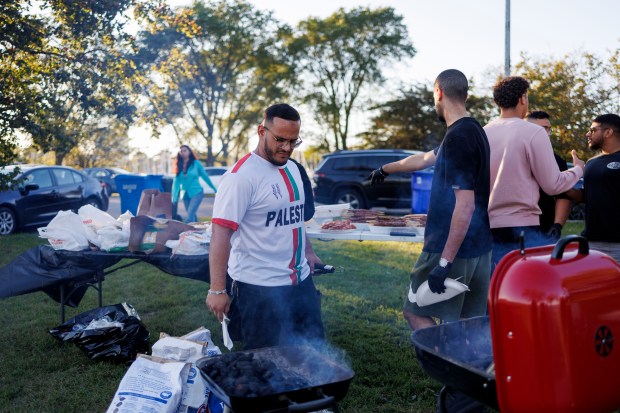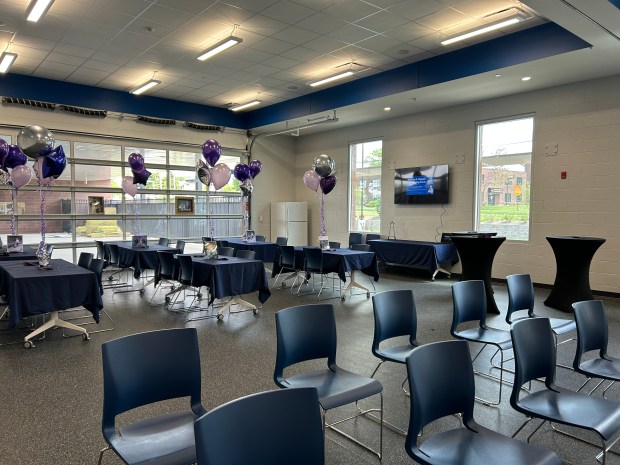When Chicago-area college students returned to campus this fall, they were greeted with more than just new lectures, readings and tests. Many local universities welcomed students back with drastically revised guidelines around protest and political speech.
In the wake of a wave of mass student demonstrations against the war in Gaza earlier this year, dozens of universities across the United States have adopted new policies for the current school year regulating when, where and how students can engage in political protest. Advocates for free speech and academic freedom have begun to ring the alarm.
Many Chicago-area schools have unveiled more restrictive new policies surrounding student protest, including Northwestern University, DePaul University, Loyola University Chicago and the School of the Art Institute of Chicago. Among the announced rules are restrictions of protests to daytime business hours, designated “free speech zones,” bans on unapproved flyers or banners and advance registration requirements.
Pro-Palestinian student activists in Chicago say they feel that these new policies have been specifically written to restrict their activism, although they apply to protests for any cause.
At DePaul, student groups are now required to reserve campus outdoor areas in advance in order to hold a protest. But the school’s chapter of Students for Justice in Palestine can’t reserve university space at all because it was “sanctioned” by DePaul over the summer, making an authorized protest impossible, according to Henna Ayesh, the group’s president.
“I think we’ve realized that with these new guidelines, it’s essentially just a scare tactic, and DePaul just does not want us to continue to protest or demand justice for our personal beliefs,” said Ayesh, who is Palestinian. “Right now what we’re seeing is universities kind of having a problem with themselves, in terms of whether or not they’re going to follow their own missions and their own values.”
A DePaul spokesperson confirmed in a Sept. 19 email that Students for Justice in Palestine has “restrictions on its ability to reserve university facilities” due to their involvement in organizing an encampment this spring.
Many of the new guidelines introduced at Chicago universities — and at other institutions around the country — appear tailored to prevent the re-emergence of pro-Palestinian protest encampments, experts say.
Over the past two months, a number of national organizations dedicated to academic freedom and First Amendment rights have condemned some of these new policies, including the American Association of University Professors and civil liberties group The Foundation for Individual Rights and Expression.
“Once we have our rights taken away from us, it’s harder to get them back,” said American Association of University Professors general counsel Risa Lieberwitz in an interview with the Tribune. “The universities may be responding to an immediate event, but this is going to affect all speech and protest and dissent on campus. … The chilling effect from these kinds of restrictions will likely be pervasive and lasting.”
Free speech values, new restrictions
The establishment of pro-Palestinian protest encampments this spring at universities across the country — including the University of Chicago, Northwestern and DePaul — raised questions regarding the limits of campus free expression, particularly as some Jewish students expressed concerns of antisemitism. Some administrators called in police to remove student demonstrators, while others introduced new rules explicitly prohibiting encampments.
After students built an encampment on Northwestern’s Deering Meadow in late April, administrators announced an immediate “addendum” to its protest policy banning tents and other temporary structures in public spaces on campus — a change now codified in its 2024-2025 policy.
On Aug. 8, DePaul was the earliest Chicago university to announce its updated policies. Within weeks, Loyola, SAIC and Northwestern followed suit.
Last week, the U. of C. was the last to release its revised demonstration guidelines. Although it clarified that “staying overnight in outdoor structures on campus” is prohibited — thereby barring any encampments — the university noticeably did not go as far as its other Chicago-area peers, still allowing spontaneous and unregistered demonstrations on campus without introducing new time or place restrictions.
Two days after unveiling its protest policy, U. of C. — a school that has historically prided itself on its commitment to free speech — announced that it had received a $100 million donation to support free expression on campus.
Though the universities’ new rules are technically written to be content-neutral, meaning they don’t explicitly single out a viewpoint, Lieberwitz said that “everybody knows” their motivation given their timing and the ongoing political pressure on universities. This administrative response to speech about a specific issue is “inappropriate,” Lieberwitz added.
“It’s not uncommon for colleges to review their policies over the summer and bring out new regulations,” said Laura Beltz, director of policy reform for the Foundation for Individual Rights and Expression. “But we have seen a number of greater restrictions that aren’t reasonable coming into colleges across the country, that we have concerns that students are getting the message that they can’t get out and protest and share their views on campus.”
Unlike private universities, public universities are legally required to adhere to the First Amendment and can be held in violation of the Constitution for policies restricting student speech. The American Civil Liberties Union of Indiana sued Indiana University — a public institution — on Aug. 29 over its new ban on “expressive activity” between 11 p.m. and 6 a.m., a similar policy to those incorporated recently by some private colleges.
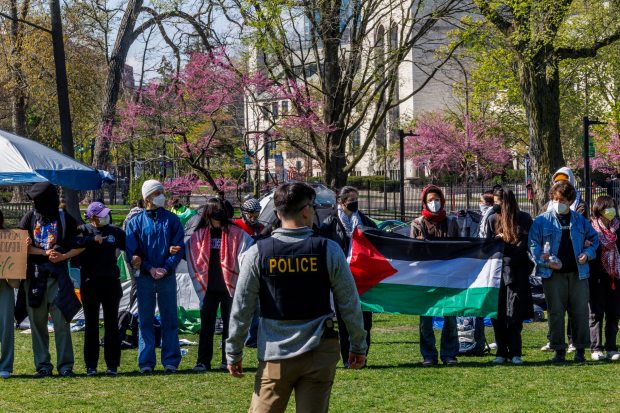
However, the vast majority of private universities have voluntarily committed themselves to language promising the protection of student free speech, according to Beltz.
Loyola declares that students have “the right to freedom of speech, expression, and assembly,” intentionally evoking First Amendment language, while Northwestern states that it is “committed to the ideals of academic freedom and freedom of speech.” When questioned about its new policies, a DePaul spokesperson wrote to the Tribune that the school does “embrace academic freedom and free expression” and “support and welcome dissent and debate.”
Beltz said private colleges have these kinds of clear policies, “and so students have an expectation that they’ll be getting these free speech rights just like their public school peers.”
Beltz said she was especially troubled by new requirements for protests to be registered in advance, which have now been introduced at Northwestern, DePaul and SAIC. At Loyola, too, such a policy has been reinstated after it was removed in 2016. This means that “students can’t get out and spontaneously protest” even in the case of breaking news, which she said does not align with universities’ “promises” that they will uphold First Amendment standards.
Overwhelmingly, university faculty across the country were not consulted or even warned before these new guidelines were established, according to Lieberwitz. A key principle of academic freedom is that faculty should be involved in the governance of their universities, she said.
Laura Goldstein, a senior lecturer in English at Loyola, said the university’s major policy changes had not been communicated to faculty. Goldstein only found out when students posted about the changes on social media and now feel “blindsided” and “betrayed,” they said.
Goldstein is also the faculty adviser for Students for Justice in Palestine, and accompanied its student leaders to a meeting with Loyola administrators on Sept. 25. They said students were “ultimately told to obey the rules, and that the rules would not be changing this year.”
A day after the meeting, Goldstein began to assemble a coalition of Loyola faculty to push back against the new restrictions. Loyola’s suppression of opportunities for student protest reveals “a lack of understanding about the history of real change in our country and our society,” Goldstein said.
‘Inherently disruptive’
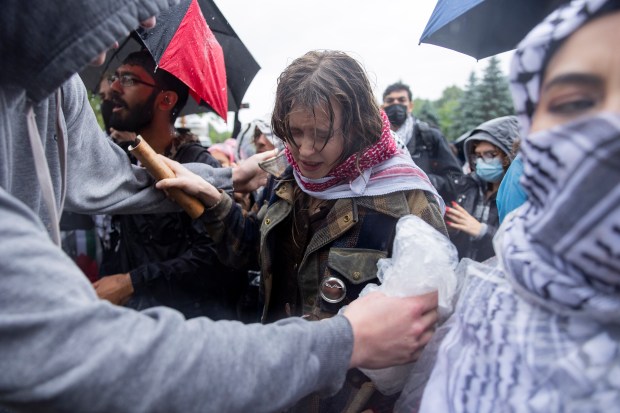
Shahd Musleh, a senior at Loyola of Palestinian origin who grew up in Chicago’s north suburbs, said she thinks Loyola’s new rules “tie our hands behind our back so we don’t demonstrate.” Musleh is the current president of the Loyola branch of Students for Justice in Palestine.
In addition to requiring all protests be registered three business days in advance with the Office of the Dean of Students, which will “provide verification … about whether the demonstration may occur or not,” Loyola’s new policy also mandates the designation of an individual “student demonstration leader.”
Loyola spokesperson Christian Anderson wrote in an email to the Tribune that the university “does not anticipate” denying any demonstration requests. He added that the designation of a student demonstration leader “enhances planning and communication” and “clearly affirms that Loyola students and not outside groups are in charge of the event.”
This particular provision has concerned student activists at Loyola, Musleh said, as it puts a “target” on an individual student.
“The point of a demonstration is to spread out that responsibility, because this school cannot hold everyone accountable,” Musleh said. “And now they want to hold one person accountable. How is that going to affect our standing at the school?”
Loyola student government President Daniel Williams said that before the beginning of the school year, university administrators held a special meeting with student government leaders to discuss the policies. Originally, Williams said he was “a little concerned.” However, he said administrators emphasized that the new rules aimed to protect “student safety” — and were not necessarily permanent beyond this academic year.
With the presidential election coming up in November, Williams said that he specifically wondered whether students would still be able to spontaneously protest in the case of certain results or breaking news. Administrators told him that despite the typical requirement for registration three days in advance, “so long as they fill out that form, it should be OK,” he said.
A copy of Loyola’s Demonstration and Fixed Exhibit Registration Form obtained by the Tribune requires students to share the “content or viewpoint (they) wish to convey” and describe how their demonstration “promotes or connects to Loyola’s Jesuit values.”
Demonstrations at Loyola may now only occur between 9 a.m. and 5 p.m. in a designated “free speech zone,” located on the West Quad of the university’s Lake Shore Campus. This spring, pro-Palestinian protesters held their demonstrations on the East Quad, Musleh said, which got more foot traffic.
Anderson wrote that Loyola’s free speech zone “addresses the practical challenges of safely staging demonstrations in constricted community spaces.” Unauthorized protests may be immediately canceled, he said.
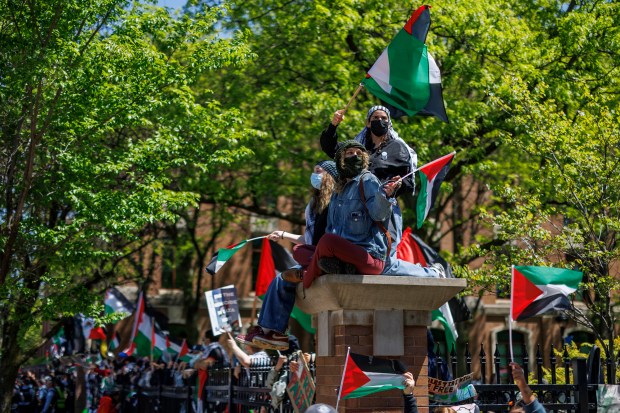
At the School of the Art Institute of Chicago, protests will similarly only be allowed in a campus event space known as the 280 Pit, which must also be reserved three business days in advance. Demonstrations must be pre-approved by the university.
In an email to the Tribune, interim Vice President and Dean of Student Affairs Debbie Martin wrote that SAIC was “guided by the philosophy of helping students facilitate peaceful demonstrations that do not disrupt the campus.”
However, Lieberwitz, from the professors association, said she takes issue with universities justifying protest restrictions based on the fact that they will reduce “disruption.”
“Demonstrations and protests are inherently disruptive,” Lieberwitz said. “They’re disruptive in raising issues and making noise, in bringing attention to the issues that are in protest. Disruption is part of learning, it’s part of free speech, it’s part of being in a university. And so simply convenience and avoiding any disruption is not an accurate basis for a university to limit speech.”
In 2016, Musleh noted, protests at Loyola resulted in a more liberalized policy on student demonstrations. Student protests were no longer required to be registered in advance and could occur indoors in the Damen Student Center, a hub for student life where Students for Justice in Palestine events had taken place until the new rules were announced. Musleh said she was disappointed to see how these gains of past student protesters have been reversed.
“They’re hypocrites,” Musleh said. “Instead of moving forward and being more inclusive and a better ‘Jesuit university,’ as they like to call themselves, they went 50 steps back and became very conservative.”
While protests at Loyola are limited to business hours, at Northwestern’s Evanston campus, demonstrations at “the Rock” — a large boulder and central outdoor landmark where student groups have protested in the past — cannot occur until after 3 p.m. on weekdays, while overnight demonstrations are prohibited. Any outdoor protest spaces must be reserved.
Bans on overnight demonstrations prohibit “traditional ways in which protest has taken place over many, many years,” said Lieberwitz, including candlelight vigils.
Though Northwestern now bans overnight camping, it makes an exception for one beloved university tradition. Students will still be allowed to pitch a tent overnight when painting the Rock, which has historically been decorated by clubs and other campus organizations.
Evgeny Stolyarov, a student organizer with Northwestern’s chapter of anti-Zionist Jewish organization Jewish Voice for Peace, said he felt “disgust” when he saw the new policies.
“It’s authoritarian, it clashes with the principles of freedom of speech that all our universities are based on, the ideas that we’re supposed to be changing ideas and flourishing and questioning things,” Stolyarov said.
When asked for comment, a Northwestern spokesperson referred the Tribune to the university president’s public statements.
Northwestern’s new policy also defines teach-ins — educational forums held by activists focusing on a specific political issue — as demonstrations, which means such events are now subject to time limitations and registration requirements.
“So to be clear, the university is now banning or severely limiting teaching at a university,” Stolyarov said.
At DePaul, Students for Justice in Palestine has begun to hold protests on city sidewalks — where First Amendment laws apply — instead of their own campus, said Ayesh, the group’s president. Recently, they held an event at Montrose Beach, while Palestinian-owned Nabala Cafe in Uptown has also offered its space to the group.
Advocates for academic freedom said they are concerned that these waves of restrictions may undermine the very ideals of the university itself.
“The way that we develop learning and thinking is by being able to debate, being able to question the status quo, being able to discuss, including vehement kinds of heated discussions around these issues,” Lieberwitz said. “For university administration to take a law-and-order kind of approach to controlling speech and controlling thought is contradictory to the very purpose of a university.”


